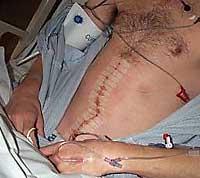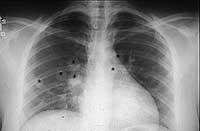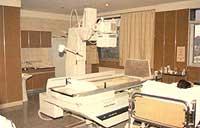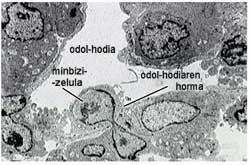Testicular cancer: repair
2002/02/26 Carton Virto, Eider - Elhuyar Zientzia
Many of those affected by testicular cancer recover, and treatment results are so satisfying that they live for a long time. It is estimated that more than 90% is cured and that the recovery rate is almost 50% in the worst forecasts. Therefore, researchers are increasingly concerned about the long-term risks that overtreatment can cause to patients. "Somehow, patients have become victims of successful treatment," said Dr. Fizazi.

As cancer is fought, long-term side effects become increasingly important. Therefore, Dr. Fizazi believes that research should begin to focus its side effects and that it is advisable to classify possible treatments based on long-term risks.
These statements were made on the occasion of the results of two research groups published by Dr. Fizazi in the February issue of the journal Annals of Oncology. In one of them, German researchers have analyzed the health status of patients undergoing chemotherapy between 13 and 17 years after receiving treatment. The other has revealed the influence of cancer treatments on the kidneys of patients.
The consequences of chemotherapy suffer the heart
Researchers at the West German Cancer Center at the University of Essen have analyzed the health status of 32 patients aged 30 to 59. Patients studied had a metastatic phase III nonseminoma and received chemotherapy with cisplatin and doxoruvina between 13 and 17 years earlier.
Although all patients have reported feeling healthy, researchers have detected a wide range of potentially dangerous side effects. The left ventricle of the heart of almost a third does not work normally, although only one of them has suffered a heart attack (he was a smoker). Three quarters present high indicators of low testosterone level. Cholesterol levels of 80% and triglycerides of 44% are higher than expected, two of the factors that increase the risk of heart disease. However, no patient has ever developed cancer again, even though treatment for testicular cancer presents this risk.
Dr. Strumberg, head of the research, was surprised by the cardiovascular problems developed by patients, since cisplatina and doxorubyzine are not considered to cause these problems. According to the researchers, it may be related to hormonal alterations detected by the cardiovascular problem. "With this study we have shown that patients treated with cisplatin and doxoruvina live healthy, but at the same time it has been shown that patients who have overcome testicular cancer are more likely to suffer cardiovascular disease than to develop cancer again," said Dr. Strumberg, "so it is advisable to control their weight, blood pressure and cholesterol level."
To the detriment of the kidney

Dr. Sophie Fossa's team at Radium Hospital in Norway has analyzed the kidneys of 85 patients who have passed testicular cancer. Patients have been divided into three groups: 14 only mutilated lymph nodes, 18 radiation therapy and 53 chemotherapy. Patients had cancer between 1984 and 88.
15 years later, the researchers noted that they detected alterations in the kidneys of 25 patients, of whom 23 were radiotherapies or chemotherapy. On the other hand, it is observed that the damage depends on therapy: the renal activity of radiotherapies has decreased by 8% and the damage has become detectable in 3-5 years. Among chemotherapy recipients, the reduction was 15% and could be detected immediately after treatment. The greatest damage has been detected in patients who underwent radiation therapy and chemotherapy.
Although renal alterations are at the preclinical level, Dr. Fossa believes that the situation will worsen with age. Therefore, he has indicated that when treating any other disease, it is necessary to take into account the possible incidence of drugs in the kidneys of these patients.

Gai honi buruzko eduki gehiago
Elhuyarrek garatutako teknologia





